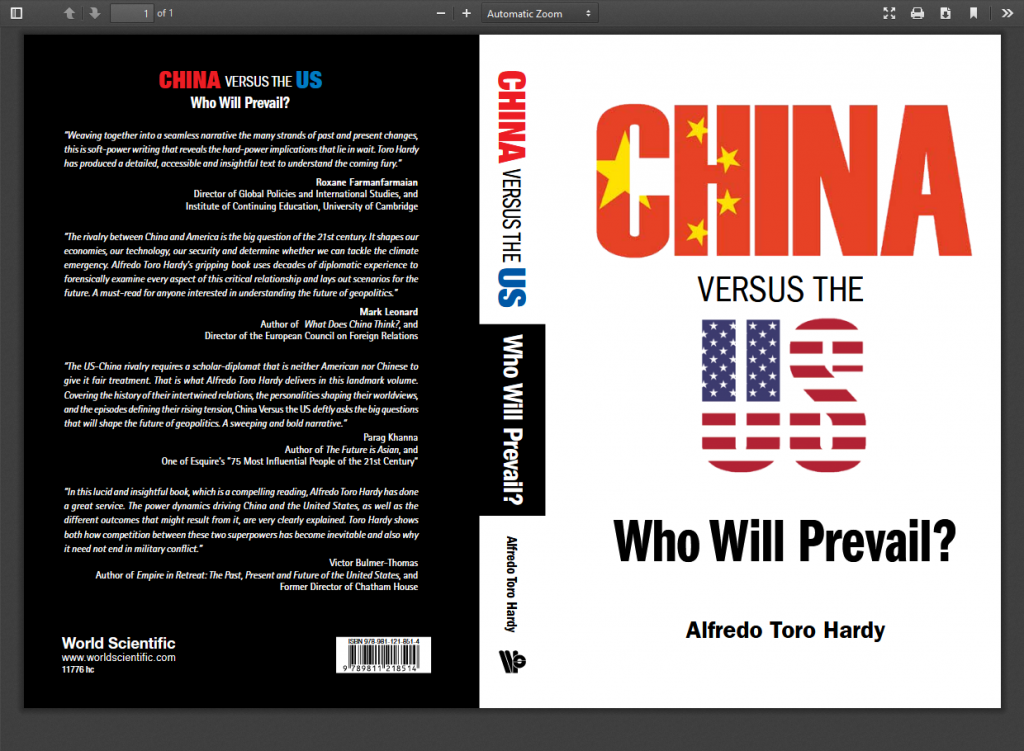The rising rivalry between China and the US generates concerns around the world. In his new book (China versus the US. Who will prevail?), Alfredo Toro Hardy (Venezuelan Scholar and Diplomat) provides an insightful analysis of open questions and mysteries drawing from his life-long experience as a diplomat. In the interview below, he addresses some of the issues of concern.
New book!
Alfredo Toro Hardy (Venezuelan Scholar and Diplomat):
China versus the US. Who will prevail?
2020, World Scientific, 304 Pages. MORE INFORMATION.
Some core messages of the interview:
- None will be ready to yield to the other.
- The Chinese have made their aims more difficult to attain.
- China would not accept to subordinate itself indefinitely to America’s leadership in its own part of the world.
- Although the US possesses overall technological superiority, China will be able to match it or surpass it in a group of key technologies.
- America’s democratic but utterly dysfunctional political system is being globally compared to China’s authoritarian but responsive one. There is no doubt that for many the latter results more attractive.
- While globalization has allowed China to lift 800 million people out of poverty, nationalism identifies itself with the belief that the country’s ancient history and its tradition of centrality entitles it to a position of privilege.
- Technological human displacement is not privative to China.
- The confrontation between China and the US has become structural and not simply conjectural.
GLO Fellow Alfredo Toro Hardy, Venezuelan Scholar and Diplomat, is a former Ambassador of the Bolivarian Republic of Venezuela to the US, UK, Spain, Brazil, Chile, Ireland and Singapore.

Interview
GLO: Why has US-China competition become inevitable?
Alfredo Toro Hardy: Both countries perceive themselves as pinnacles within human history. The Middle Kingdom and the Exceptional Nation feel entitled to leadership by history or providence. Both look at the future under the lenses of their national myths. Under those circumstances none will be ready to yield to the other. Specially so as the gap in their comprehensive national power is rapidly closing.
GLO: Was China challenging the US too early?
Alfredo Toro Hardy: There seems to be no doubt that by speeding times, heralding their ambitions and boasting about their capabilities, while at the same time hardening their geopolitical and military stance, the Chinese have made their aims more difficult to attain. They have created for themselves many unnecessary problems. However, for a county as obsessed as China in continuously measuring its comprehensive national power, it would seem to be out of context to have provoked U.S. reaction if they have felt unprepared for a measurement of forces.
GLO: The obvious US response would be a long-term containment policy of China. How could this work?
Alfredo Toro Hardy: A long-term containment of China by the United States, would be the latter’s preferred option. Specially so, given the final success of this policy in relation to the Soviet Union. However, there is a big difference in both cases. During the Cold War, neither the Americans nor the Soviets challenged each other’s main spheres of influence (Cuba excepted, and this almost led to war). The contrast with the current situation is notorious. The United States’ containment of China not only includes Taiwan (which China considers to be an integral part of its territory) but takes place in an area that for millennia was a tributary dependent region of China. China would not accept to subordinate itself indefinitely to America’s leadership in its own part of the world.
GLO: You seem to suggest that China has the better cards to win the competition for world leadership, why?
Alfredo Toro Hardy: Although the United States still prevails in military, economic and technological capabilities, reverse trend in motion favor China. Economically, China’s ascendancy and its surpassing of the US seems inevitable. Militarily, China’s asymmetric power has the capacity to neutralize much of the current US superiority, while the inversely evolving budgetary capability of both countries will clearly play in favor of China. Moreover, America’s superiority in nuclear weapons may prove to be more theoretical than real if China’s overwhelming advantage in conventional ballistic missiles can match the US tactical nuclear capability, while China’s second-strike capacity can deter an American first strike. Finally, although the US possesses overall technological superiority, China will be able to match it or surpass it in a group of key technologies. On the other hand, China’s emphasis on strategically oriented basic research outweighs America’s market oriented applied research.
GLO: Globalism is under thread anyway. There is a global tendency to strengthen nationalism and autocratic regimes. A good time to popularize the Chinese model?
Alfredo Toro Hardy: Contrary to the Cold War with the USSR, America’s emerging Cold War with China is not based in ideology but in the efficiency that both countries’ models can exhibit. If we measure such efficiency by the handling of the Covid 19 pandemic, a clear difference emerges. Although the initial lack of transparency by China had a great impact in the global diffusion of the Coronavirus (and this certainly plays against its model), the extraordinary efficiency shown by this country in the domestic containment of the virus grossly contrasts with the botched response by the United States. America’s democratic but utterly dysfunctional political system is being globally compared to China’s authoritarian but responsive one. There is no doubt that for many the latter results more attractive.
GLO: In the Chinese understanding, there is complementarity of nationalism and globalization. What is the explanation?
Alfredo Toro Hardy: Chinese culture includes the complementary of opposites as exemplified by the duality of yin and yang. Within that context, globalization (so far synonymous of economic prosperity) and nationalism are seen as interdependent expressions of state policy, which converge in the aim of legitimizing the regime in the eyes of its citizens. While globalization has allowed China to lift 800 million people out of poverty, nationalism identifies itself with the belief that the country’s ancient history and its tradition of centrality entitles it to a position of privilege. Moreover, a century of humiliation by foreign powers impose the need to stand tall. This dual policy has been conceptualized under the aphorism of “grabbing with the two hands”. However, keeping the equilibrium between these forces is a daunting task. One false step, one overreach, one overreaction and everything might be blown to pieces.
GLO: Unlike the US, China’s future is burdened with its demographic problems (ageing, immigration pressure) and the need to achieve welfare increases through international trade, e.g. by importing necessary food. Is this not a challenge for the Chinese ambitions?
Alfredo Toro Hardy: With a rapidly aging population, as a result of the combination of low fertility rate and rising life expectancy, technology becomes a providential answer to the country’s quest to attain its “rejuvenation” –a nationalistic catchword that glues together the Chinese Communist Party and the Chinese population. Technology and rejuvenation thus become inseparable notions. Under those circumstances the search of economic prosperity and nationalism, the two strongest legitimizing forces of the regime, blend in their support to technology. However, even if technology “rejuvenate” the country it also displaces human labor and can significantly affect the welfare of many segments of society. Technological human displacement, though, is not privative to China. On the contrary, it is in the process of becoming one of the world’s biggest challenges of the Twenty First century. For the US, with a much larger percent of relay population and a lack of unifying national banners, this may lead to a more complex situation than China’s.
GLO: What role can the results of the forthcoming US Presidential elections play for the next phase of the US-China competition?
Alfredo Toro Hardy: I am afraid that a change in the White House may not change much. The confrontation between China and the US has become structural and not simply conjectural. Xi Jinping pursues fenfa youwei, meaning the attainment of great aims. This translates into a position of leadership in world affairs and a redefinition of its geopolitical footprint in Asia. For the United States this represents an unacceptable challenge to its leadership. In the same manner in which an expansive Chinese nationalism upholds Xi’s aims, a wide domestic coalition and an anti China popular sentiment sustain America’s reaction to that country’s assertiveness. Under those circumstances, Trump’s departure from the White House would only bring down Washington’s circus show, but not the emerging Cold War.
*************
With Alfredo Toro Hardy spoke Klaus F. Zimmermann, GLO President.

Ends;

